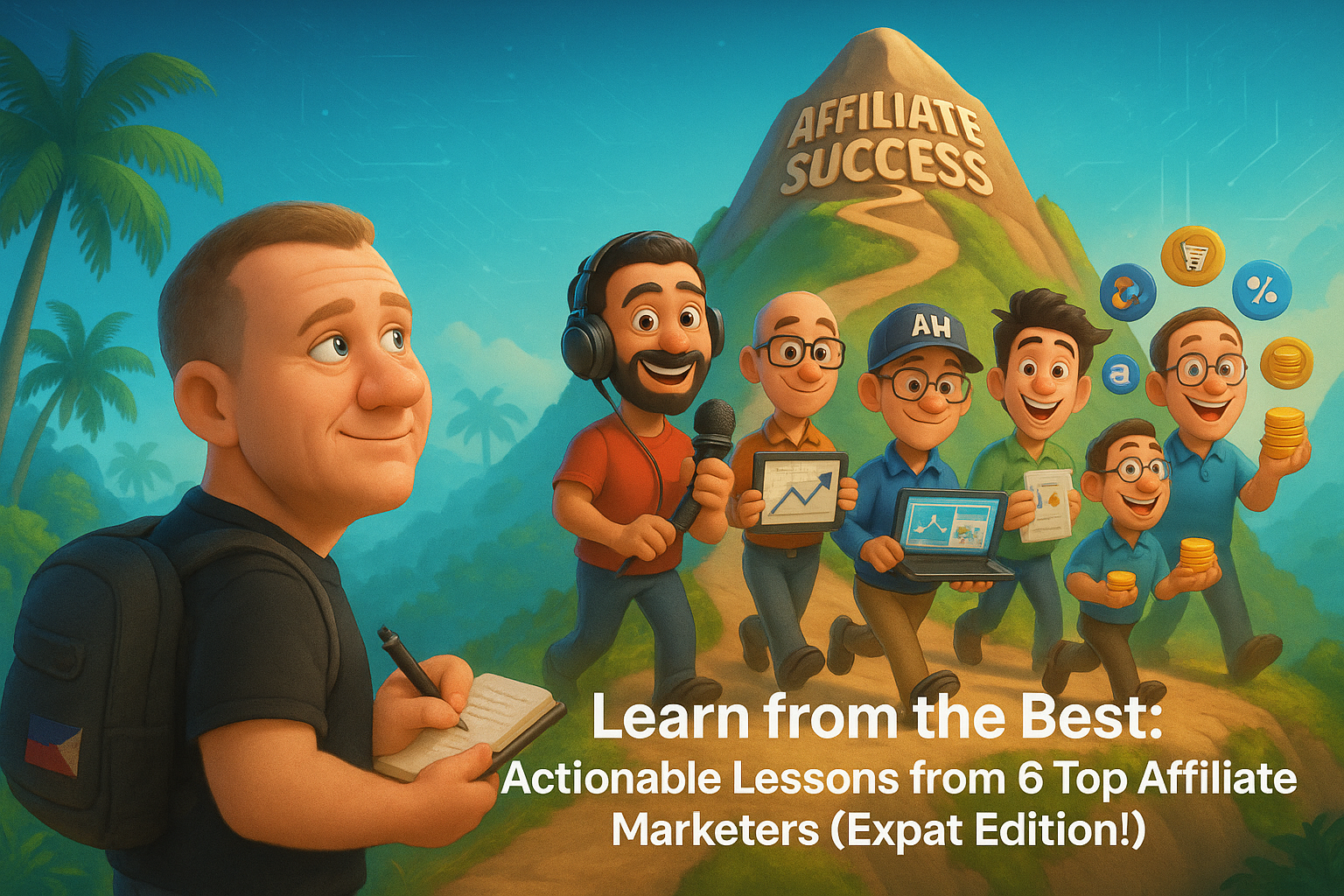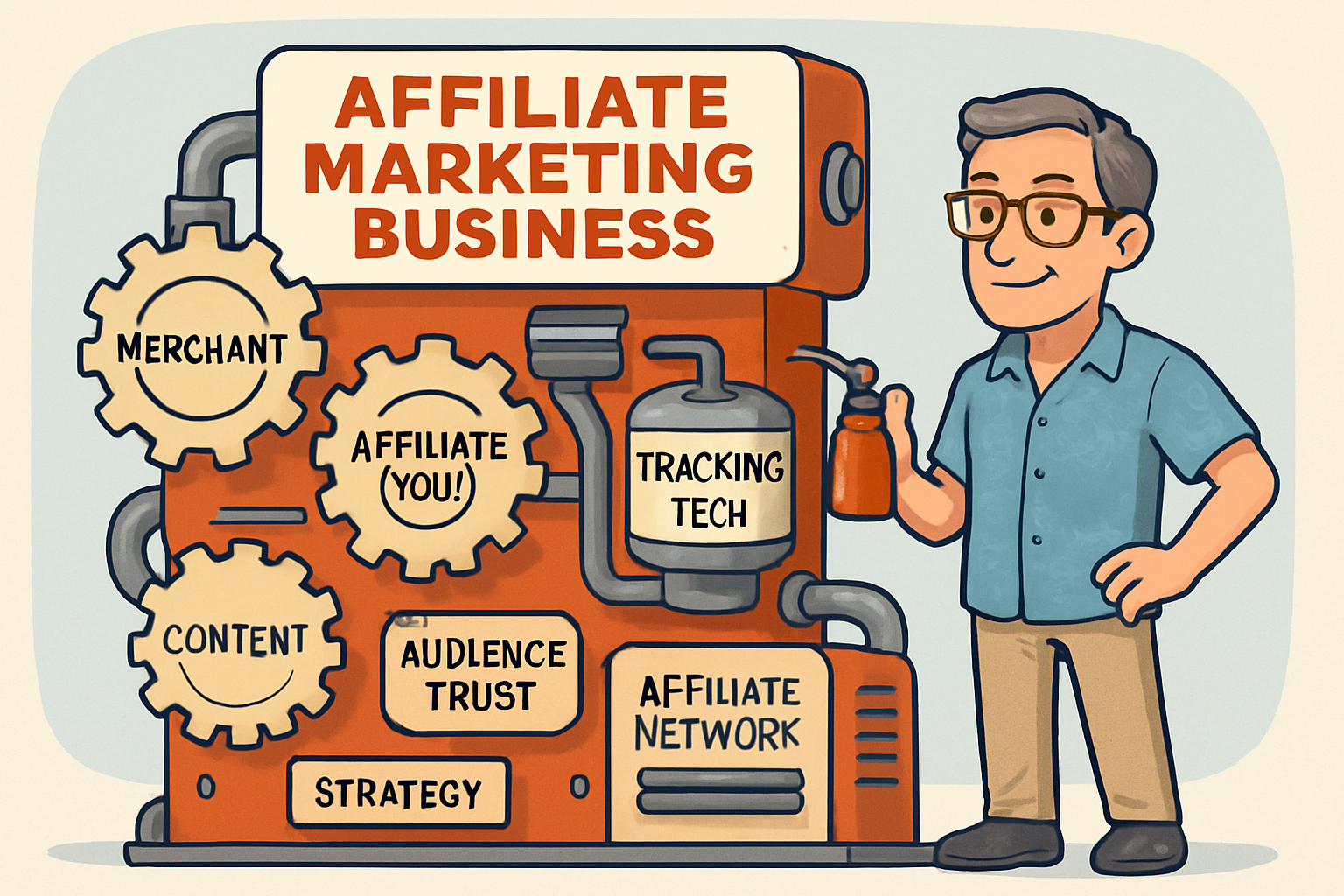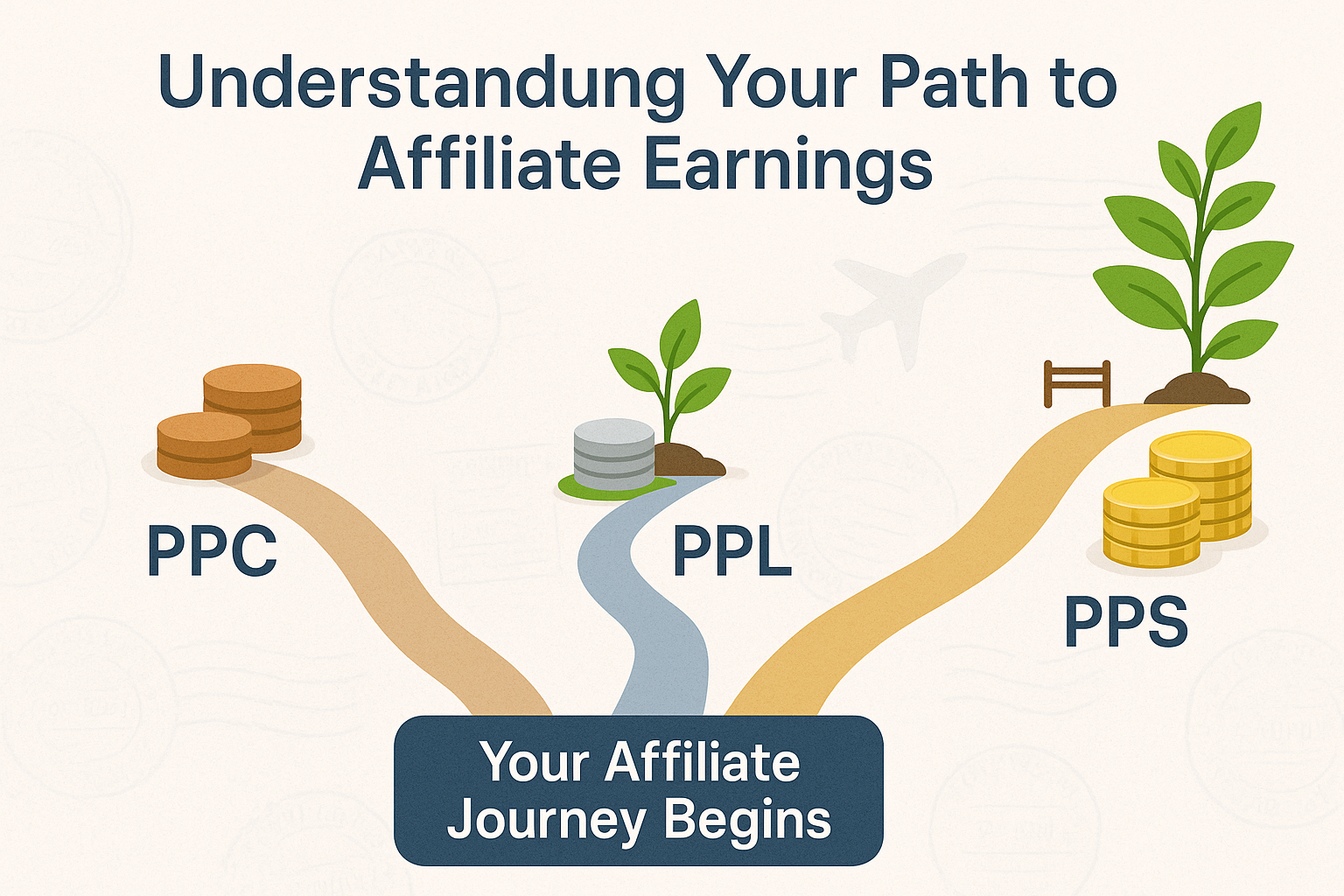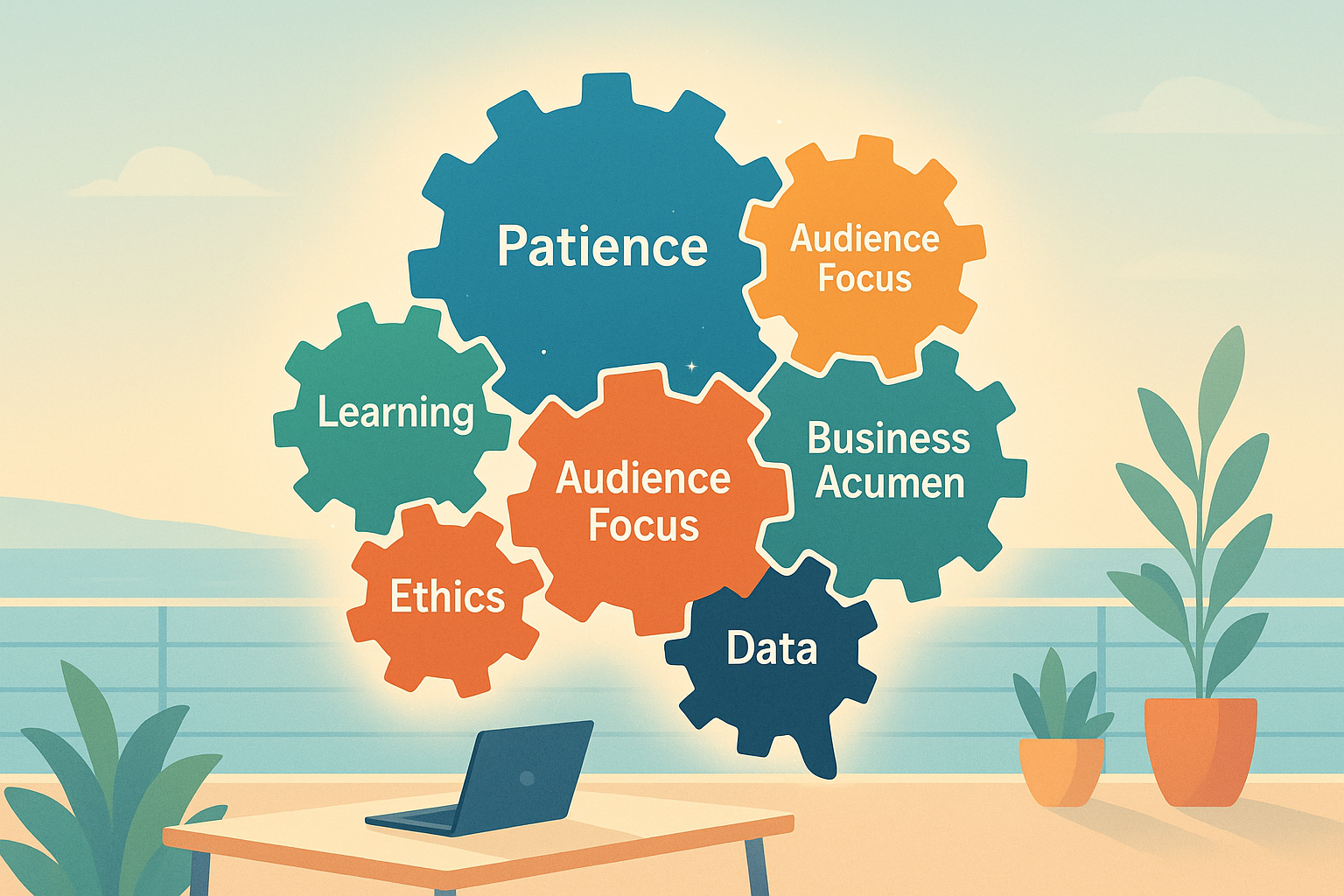Hey there, fellow freedom seeker and aspiring online entrepreneur!
You’re here because you’re looking at affiliate marketing, maybe dreaming of that flexible income that lets you live life on your own terms – perhaps from a beach in Southeast Asia, a mountain town in Europe, or just your favorite spot at home without the daily commute. You know the tactics matter – SEO, content, social media – but you’ve also probably heard whispers, or maybe even experienced firsthand, that just knowing the “how-to” isn’t enough. Many people start affiliate marketing, try the tactics, and still don’t achieve lasting success. The key differentiator often lies in their affiliate marketing mindset.
So, what’s the missing piece? More often than not, it comes down to having the right affiliate marketing mindset. It’s the internal game – the way you think about challenges, setbacks, and the entire process – that truly determines if you’ll push through the tough times and build something sustainable.
I’ve been navigating the online world for over 21 years, living outside my home country, and believe me, I’ve faced my share of challenges. There were times I felt lost, times results were slow, and times I questioned if I was doing it right. What I learned, often the hard way, is that mindset wasn’t just a factor; it was the factor that kept me going when tactics alone weren’t enough. It’s what helps you manage your time effectively when you’re juggling a side hustle, overcome the feeling of “lack of knowledge” by embracing learning, and build consistent income by staying persistent through the inevitable ups and downs. This enduring affiliate marketing mindset is what we’ll explore.
In this guide, we’re going to dive deep into the essential affiliate marketing mindset you need for long-term success. We’ll talk about why patience and persistence are non-negotiable, look at the common challenges and failure points this mindset helps you overcome, break down the key pillars of an enduring affiliate marketing mindset, and show you how cultivating these attributes is your roadmap to building a thriving online business.
Ready to build the internal strength that fuels external success? Let’s get started.
Section 1: The Long Game: Why Your Mindset Matters More Than Tactics
You’ve probably heard it before, but it bears repeating: the journey to profitability in affiliate marketing is a marathon, not a sprint. A fundamental misunderstanding of the time and effort required is a primary reason why many aspiring affiliates fail. They focus only on the finish line (the income) and not the training needed for the race itself. Developing the right affiliate marketing mindset is that training.
Patience and Persistence: Non-Negotiable for the Marathon Mindset
Building the necessary components for success—a loyal audience, credibility, substantial high-quality content, and search engine authority—takes considerable time and consistent dedication. Search engines need time to index new sites and content, and visitors require multiple interactions before trusting recommendations.
Setting realistic expectations regarding timelines is crucial for maintaining motivation. While some may see initial earnings relatively quickly depending on their strategy and existing audience, most affiliate marketers begin generating their first commissions between the six-month and one-year mark. Achieving consistent and substantial income often takes longer, typically requiring one to two years or more as a website or platform gains authority and content ranks higher in search results. Success stories like Pat Flynn’s, who took years to build his significant affiliate income, underscore the necessity of a long-term view. As Warren Buffet metaphorically stated, “Someone’s sitting in the shade today because someone planted a tree a long time ago.” This long incubation period demands significant patience – a key aspect of the affiliate marketing mindset.
Beyond patience, persistence is paramount. The initial phases often involve substantial effort with minimal immediate financial reward. Fluctuations in income, especially early on, are common. Marketers must consistently create valuable content, engage with their audience, build relationships, and refine their strategies even when results seem slow. Many give up prematurely, often just before their efforts might have started yielding significant returns, precisely because they lack the persistence to push through the initial challenges and the “waiting game.” Overcoming obstacles, whether they are low initial earnings, technical difficulties, or shifts in the market, requires determination and a commitment to the long-term vision. Hard work and persistence are obligatory factors for success in this competitive field, forming the bedrock of a resilient affiliate marketing mindset.
(I can definitely relate to this. There were times in my journey where progress felt agonizingly slow. But looking back now, from the “shade” of a more established business, I know that sticking with it through those periods was the only way to get here. It’s a lesson learned over years, living through different online business cycles).

[Image Placeholder: affiliate_marathon_runner.jpg] [Caption: Affiliate marketing is a marathon, not a sprint. Patience and persistence are your most important gear.] [Alt Text: Comical illustration of a determined runner in an affiliate marketing marathon passing milestones labeled with timeframes like 6 Months and 1 Year, representing the long-term commitment needed.] [Image Generation Prompt: Aspect ratio 4:3. Pixar-style comical illustration. A single person (representing an affiliate marketer) is running a marathon. They look determined but also slightly sweaty and tired, showing the effort involved in a humorous way. The path is winding into the distance. Along the path, there are simple, slightly comical mile markers or signs indicating timeframes like “6 Months”, “1 Year”, “3 Years”. The horizon ahead is bright and positive, suggesting future success. The runner’s expression should be one of focused perseverance, perhaps with a slightly exaggerated determined grimace.]
Navigating the Terrain: Challenges That Test Your Affiliate Marketing Mindset
Despite its potential, affiliate marketing is characterized by a high failure rate, with estimates suggesting that a large percentage of newcomers do not achieve sustainable success. Understanding the common pitfalls and broader industry challenges is essential for cultivating the right mindset to overcome them. These are the obstacles your mindset helps you navigate.
Common Reasons for Individual Failure
Many aspiring affiliates stumble due to predictable mistakes rooted in their approach, often stemming from a flawed affiliate marketing mindset:
- Impatience and Unrealistic Expectations: As discussed, many enter affiliate marketing expecting quick riches, fueled by misleading online narratives. When substantial income doesn’t materialize within weeks or months, discouragement sets in, leading many to abandon their efforts too early. This is a direct result of lacking a long-term affiliate marketing mindset.
- Hobbyist Mindset: Treating affiliate marketing as a casual hobby rather than a serious business venture is a recipe for poor results. Success requires strategic thinking, planning, consistent effort, and data-driven decision-making, akin to running any startup. Cultivating a business-oriented affiliate marketing mindset is key here.
- Poor Niche Selection: Choosing the wrong niche is a critical error. This can involve picking overly broad niches, niches with low buyer intent, highly saturated markets without a unique angle, or niches the affiliate lacks genuine interest, passion, or knowledge in. Passion is vital for maintaining motivation through the long initial phase – a core component of the right affiliate marketing mindset.
- Insufficient Value and Poor Content: Simply publishing content isn’t enough; it must be high-quality, valuable, and genuinely helpful to the audience. Many fail by creating thin, low-quality, or overly salesy content that doesn’t build trust or solve audience problems. Blindly copying competitors’ content without understanding one’s own audience is also ineffective. An audience-centric affiliate marketing mindset prevents this.
- Ignoring the Audience and Failing to Build Trust: Success hinges on understanding and connecting with the target audience. Failing to research audience needs, pain points, and preferences leads to misaligned promotions and low conversion rates. Lack of transparency and dishonest practices erode trust, which is the foundation of affiliate relationships. A trust-focused affiliate marketing mindset is crucial here.
- Focusing Solely on Selling: An aggressive “hard sell” approach repels modern consumers. Affiliates who prioritize commissions over helping their audience solve problems or find valuable solutions fail to build the necessary trust and rapport for long-term conversions. The affiliate’s role is often seen as “selling the click” by providing value and pre-selling the solution, rather than directly selling the product itself. This is a common mistake when the affiliate marketing mindset is purely transactional.
- Lack of Strategy and Planning: Many beginners jump in without clear goals, a defined strategy, or a plan for execution. This lack of direction leads to scattered efforts and an inability to measure progress or make informed adjustments. A strategic affiliate marketing mindset involves planning.
- Inadequate Learning and Adaptability: The digital marketing landscape evolves rapidly. Relying on outdated strategies and tactics found online, or failing to continuously learn and adapt to algorithm changes and new trends, is a common path to failure. A continuous learning affiliate marketing mindset is essential.
- Technical Deficiencies: Neglecting crucial technical aspects like Search Engine Optimization (SEO), website quality (speed, user experience, mobile optimization), or reliable tracking mechanisms hinders visibility and performance. While not strictly mindset, the willingness to learn these (overcoming “lack of knowledge”) is part of the affiliate marketing mindset.
- Ethical Lapses: Engaging in unethical practices such as failing to disclose affiliate relationships, promoting low-quality or scam products, or using deceptive marketing tactics damages credibility and trust, ultimately undermining long-term success. An ethical affiliate marketing mindset is non-negotiable.
- Inconsistent Effort and Quitting Too Soon: As mentioned, lack of persistence and giving up before strategies have time to mature is a major failure point. This highlights the importance of the persistence aspect of the affiliate marketing mindset.
- Shiny Object Syndrome: Constantly jumping between different niches, platforms, traffic sources, or training courses without mastering any single one prevents affiliates from gaining expertise and achieving traction. This is a classic sign of lacking a focused, long-term affiliate marketing mindset.
Broader Industry Challenges
Beyond individual mistakes, affiliates must navigate inherent industry challenges that require a resilient affiliate marketing mindset:
- Competition and Saturation: The affiliate marketing space is crowded, making it difficult to stand out, especially in popular niches. A determined affiliate marketing mindset helps you find your unique angle.
- Algorithm Updates: Reliance on platforms like Google or social media means that algorithm changes can drastically impact traffic and earnings. An adaptable affiliate marketing mindset helps you pivot.
- Regulatory Changes: Increasing scrutiny and regulations around disclosures (FTC), data privacy (GDPR, CCPA), and advertising ethics require constant vigilance and compliance. An ethical affiliate marketing mindset embraces this.
- Ad Blockers: The rise of ad blockers impacts the effectiveness of traditional display advertising methods. An adaptable affiliate marketing mindset explores new promotion methods.
- Attribution Complications: Tracking sales accurately across multiple devices and touchpoints before a purchase is increasingly complex, potentially leading to commission disputes. A persistent affiliate marketing mindset works through these issues.
- Rising Costs: Costs for paid advertising (PPC, social media ads) can increase, squeezing profit margins. A business-savvy affiliate marketing mindset focuses on ROI.
- Content Saturation: The sheer volume of online content makes it harder to capture audience attention, demanding higher quality and more unique value propositions. An audience-centric affiliate marketing mindset focuses on providing unique value.
- External Dependencies: Affiliates depend on merchants’ rules, program changes, or even company acquisitions, which can alter commission structures or terminate programs unexpectedly. An adaptable affiliate marketing mindset prepares for this.
Successfully navigating these individual pitfalls and industry headwinds requires the multifaceted, resilient affiliate marketing mindset explored in the following sections.
Section 2: The Pillars of an Enduring Affiliate Marketing Mindset
Achieving long-term success in affiliate marketing necessitates cultivating a specific set of interconnected mindset attributes. These pillars provide the foundation for navigating challenges, building a sustainable business, and achieving consistent growth. They are the core components of the essential affiliate marketing mindset.
Continuous Learning and Adaptability: A Key Affiliate Marketing Mindset Trait
The digital marketing ecosystem is in constant flux. Market trends shift, search engine algorithms evolve, new social platforms emerge, consumer behaviors change, and regulations tighten. What worked yesterday might be ineffective or even detrimental today. Consequently, a commitment to continuous learning and adaptability is not merely beneficial; it is essential for survival and growth.
Successful affiliates actively seek out new knowledge and stay informed about industry developments. This involves monitoring trends, understanding algorithm updates (like those from Google or social media platforms), exploring new marketing strategies and tools, and keeping abreast of legal and ethical standards. Relying on outdated information, often regurgitated online, is a significant contributor to failure. Investing in quality education, whether through reputable courses, industry blogs, or expert communities, is an investment in the affiliate’s own capability. (Overcoming the “lack of knowledge” pain point is a continuous process, not a one-time fix!). This proactive approach is a defining characteristic of a strong affiliate marketing mindset.
Beyond acquiring knowledge, adaptability is the crucial skill of applying that learning and pivoting strategies effectively. This means being willing to experiment with new approaches, test different traffic sources or content formats, and adjust campaigns based on performance data and market feedback. Affiliates who remain rigid in their methods risk being left behind as the landscape evolves. The ability to learn, unlearn, and relearn is a hallmark of long-term affiliate success. (This adaptability has been key in my own journey, especially when market conditions or platforms changed unexpectedly).
Image Placeholder: An illustration showing a person happily juggling multiple changing digital objects (gears, arrows, screens), representing adaptability and learning.
[Image Placeholder: adaptable_learner_juggling.jpg] [Caption: The digital world keeps changing! A great affiliate marketing mindset embraces continuous learning and adaptability.] [Alt Text: Comical illustration of a person happily juggling various digital symbols like changing gears, arrows pointing in different directions, and screens with graphs, representing continuous learning and adaptability in a dynamic online environment.] [Image Generation Prompt: Aspect ratio 4:3. Pixar-style comical illustration. A person (representing an affiliate marketer) is happily and skillfully juggling several objects that are constantly but smoothly changing shape or direction (e.g., a gear turning into an arrow, a screen showing a fluctuating graph). They look agile and content amidst the change. The background is a stylized, dynamic digital space with subtle shifting elements. The scene should convey the positive aspect of adapting and learning.]
Audience-Centricity: A Core Affiliate Marketing Mindset Pillar
At its core, successful affiliate marketing revolves around the audience. An audience-centric mindset prioritizes understanding and serving the needs of the target audience above all else, recognizing that trust and value are the currencies of sustainable affiliate income.
This begins with deeply understanding the audience: their interests, pain points, challenges, preferences, and demographics. This understanding informs niche selection, content creation, and product recommendations. The goal is to become a trusted resource within a specific niche.
Providing genuine value is paramount. This means creating high-quality, engaging, and informative content—such as in-depth reviews, helpful tutorials, comparison guides, or solutions to specific problems—rather than just pushing affiliate links. The focus should be on helping the audience make informed decisions and achieve their desired outcomes. As Neil Patel advises, understanding audience pain points is key to having an impact.
Building and maintaining trust is the cornerstone of this approach. This is achieved through honesty, authenticity, transparency (discussed further under Ethics), and consistent delivery of value. Recommending products genuinely believed in, ideally based on personal experience, resonates far more effectively than promoting anything solely for commission. When affiliates prioritize helping their audience, sales often follow as a natural consequence of the trust established. This audience-first approach leads to higher engagement, better conversion rates, and a more sustainable income stream over the long term. (This aligns perfectly with my mission to empower others – it’s all about providing value first).
Image Placeholder: An illustration of a bridge being built between a content creator (with a laptop) and an audience, with bricks labeled “Value,” “Trust,” “Authenticity.”
[Image Placeholder: building_trust_bridge.jpg] [Caption: Your content is the bridge connecting you to your audience. Build it with value and trust.] [Alt Text: Comical illustration of a bridge built with bricks labeled Value, Trust, and Authenticity, connecting a content creator to an audience.] [Image Generation Prompt: Aspect ratio 4:3. Pixar-style comical illustration with a positive and trustworthy feel. A person with a laptop is on one side of a gap (perhaps a small chasm or river), and a group of people (representing the audience) are on the other side, looking receptive and happy. A sturdy, well-built bridge is connecting the two sides. The bridge is made of large, clear bricks labeled “Value”, “Trust”, and “Authenticity”. The scene is positive and shows connection and successful communication in a warm, inviting style.]
Business Acumen: Treating It Like a Real Venture
A critical differentiator between successful and unsuccessful affiliates is the mindset with which they approach the endeavor. Those who treat affiliate marketing as a legitimate business, rather than a casual hobby or a get-rich-quick scheme, are significantly more likely to achieve long-term success. This requires adopting principles of business management, including strategic planning, goal setting, consistent execution, and financial diligence.
Strategic Planning: Successful affiliate marketing requires a structured plan. This involves defining a clear niche, identifying the target audience, selecting appropriate platforms and traffic generation methods (e.g., SEO, content marketing, social media, paid ads), choosing relevant affiliate programs, and outlining content and promotion strategies. A well-defined business plan provides direction, clarifies objectives, and helps allocate resources effectively. (Thinking about creating your own [Affiliate Marketing Business Plan]([INTERNAL LINK: The Main Components of an Affiliate Marketing Business])? It’s a key step in adopting this mindset).
Goal Setting (SMART Framework): Setting clear, measurable goals is fundamental to tracking progress and maintaining focus. The SMART framework is widely recommended: goals should be Specific, Measurable, Achievable, Relevant, and Time-bound. Examples of SMART goals in affiliate marketing include:
- Increase website traffic by 20% in the next 3 months through targeted content creation and promotion.
- Generate $5,000 in affiliate commissions in the next 6 months by joining and promoting 5 new relevant, high-commission programs.
- Build an email list of 1,000 subscribers in the next 12 months by offering a valuable free lead magnet related to the niche.
(Setting Realistic Income Goals and Expectations is part of this process!).
Consistent Effort and Execution: Planning and goal setting are ineffective without consistent action. This involves regularly creating and publishing high-quality content, promoting affiliate offers strategically, engaging with the audience, building relationships with affiliate managers, and analyzing performance data.
Financial Management: A business mindset includes managing finances effectively. This involves understanding profit margins, budgeting for potential expenses (tools, hosting, advertising), tracking income and expenses, and focusing on Return on Investment (ROI).
Strategic Focus: Treating it as a business also means focusing on high-impact activities and potentially outsourcing tasks that are time-consuming but don’t require the affiliate’s core expertise. It requires strategic decision-making based on data, not just guesswork or following trends blindly.
Image Placeholder: An illustration of a person in business attire looking determined, holding a blueprint or business plan, with gears and charts in the background.
[Image Placeholder: business_acumen_planning.jpg] [Caption: Treat your affiliate marketing like a real business, complete with planning and strategy.] [Alt Text: Comical illustration of a determined person in business attire holding a business plan or blueprint, with charts and gears floating in the background, representing business acumen and strategic planning.] [Image Generation Prompt: Aspect ratio 4:3. Pixar-style comical illustration. A person (representing an affiliate marketer) is wearing business casual attire and holding a large blueprint or business plan document, looking determined and focused. In the background, stylized icons of business elements like charts, graphs, and turning gears are visible. The scene should convey a sense of professional planning and business focus in a lighthearted way.]
Ethical Foundation: Ensuring Long-Term Credibility
Operating ethically is not merely a compliance requirement but a fundamental pillar of sustainable affiliate marketing success. An ethical approach builds the trust and credibility necessary for long-term audience loyalty and partner relationships, forming a strategic advantage over those who prioritize short-term gains through questionable tactics.
Transparency and Disclosure: The cornerstone of ethical affiliate marketing is transparency, particularly regarding the affiliate relationship. Regulatory bodies like the U.S. Federal Trade Commission (FTC) mandate clear and conspicuous disclosure whenever an affiliate stands to gain compensation (monetary or otherwise, including free products, discounts, credits) from an endorsement or link. Failure to disclose adequately can lead to legal repercussions and severely damage audience trust. Effective disclosure involves using clear language, placing it prominently near the affiliate link or endorsement, and ensuring it’s easily noticeable across all platforms. (Learn more about [Legal Basics: Affiliate Disclosures Explained]([INTERNAL LINK: Legal Basics: Affiliate Disclosures Explained (Why & How)]).
Table 1: FTC Affiliate Disclosure Guidelines & Examples
| Platform/Context | Placement Guideline | Clarity Guideline | Example Disclosure Text/Hashtag |
|---|---|---|---|
| Blog Post/Website | Near top of post AND/OR near affiliate links | Clear, simple language; conspicuous font/color; easily understood | “Disclosure: This post contains affiliate links. If you purchase through these links, I may earn a commission at no extra cost to you.” OR “(paid link)” near link OR “As an Amazon Associate I earn from qualifying purchases.” |
| Social Media | Within the post/caption itself | Unambiguous hashtags or clear statement | #ad, #sponsored (preferred over #aff or #affiliate) OR “Paid partnership with” |
| Video | Verbal statement BEFORE product mention | Clear verbal statement; visual overlay/text in description is secondary | “This video is sponsored by…” OR “As a affiliate, I may earn from qualifying purchases linked below.” |
| Email Newsletter | Within the email, near relevant links | Clear statement, easily visible | “Note: Some links in this email are affiliate links, meaning I may earn a commission if you click and buy.” |
| General | On every page/post with endorsements/links | Avoid burying in footers, ‘About’ pages, or fine print | Link to a dedicated Disclosure/Affiliate Policy page for more detail |
Choosing Reputable Partners and Products: Ethical practice extends to the selection of affiliate partners and products. Promoting low-quality products, scams, or businesses with questionable practices reflects poorly on the affiliate and erodes audience trust. Due diligence is necessary to ensure partners are reputable and products offer genuine value. Partnering with brands that align with the affiliate’s values and audience interests enhances authenticity.
Honesty in Promotions: Marketing messages must be truthful and avoid exaggeration or misleading claims. Providing balanced reviews that mention both pros and cons, based on genuine experience or thorough research, builds credibility. Authenticity is key; audiences can often sense when a recommendation is insincere.
Respecting Privacy: With increasing data privacy regulations like GDPR and CCPA, ethical affiliates must prioritize consumer privacy. This involves obtaining consent for data collection, being transparent about data usage, and implementing security measures. Respecting privacy is not only legally required but also crucial for maintaining user trust.
Ultimately, an ethical foundation supports all other pillars of the enduring mindset. It enables the trust required for audience-centricity, provides the stability needed for a long-term perspective, and builds the reputation necessary for operating as a legitimate business.
Image Placeholder: An illustration of a person standing on a solid ethical base (like a pedestal labeled “Ethics”), extending a trustworthy hand to an audience, with transparency symbols around.
[Image Placeholder: ethical_foundation_trust.jpg] [Caption: Ethics aren’t just rules; they’re the solid ground your long-term affiliate business is built on.] [Alt Text: Comical illustration of a person standing on a solid, sturdy pedestal labeled “Ethics,” extending a hand towards a group of people (audience) who look trusting. Symbols of transparency (like clear bubbles) float around.] [Image Generation Prompt: Aspect ratio 4:3. Pixar-style comical illustration. A person (representing an affiliate marketer) is standing firmly on a solid, slightly elevated platform labeled “Ethics”. They are reaching out a hand in a gesture of trust towards a group of people (representing the audience) who look receptive and trusting. Around the scene, there are subtle symbols of transparency, like clear, glowing bubbles. The overall scene should feel positive and secure.]
Section 3: Driving Growth: Leveraging Data, Testing, and Optimization
A passive approach rarely leads to sustained growth in affiliate marketing. The enduring mindset embraces proactivity, particularly in leveraging data, conducting experiments, and continuously optimizing strategies. This data-driven approach transforms subjective decision-making into an informed, iterative process crucial for navigating the competitive landscape and maximizing profitability.
The Data-Driven Mindset: Tracking and Analysis
The adage “you can’t improve what you don’t measure” holds particularly true in affiliate marketing. Tracking performance is not optional; it’s essential for understanding what strategies are effective, identifying underperforming areas, diagnosing problems, and making informed decisions to allocate resources wisely. Failing to monitor data is a common reason for stagnation and failure.
Affiliates must utilize analytics tools—ranging from built-in dashboards provided by affiliate networks or platforms to comprehensive solutions like Google Analytics and specialized affiliate tracking software—to monitor key performance indicators (KPIs). These tools provide insights into audience behavior, traffic sources, content performance, and campaign effectiveness. Regular and consistent review of this data is critical for identifying trends, spotting opportunities for improvement, and understanding the impact of implemented changes.
Key Metrics for Success (KPIs)
While numerous metrics can be tracked, focusing on the right KPIs is crucial for efficient analysis and effective optimization. Understanding these metrics, how to calculate them, and their significance allows affiliates to gauge the health and profitability of their efforts.
Table 2: Key Affiliate Marketing Metrics: Calculation & Significance
| Metric Name | Calculation Formula | What It Measures | Why It’s Important for Optimization |
|---|---|---|---|
| Clicks | Total number of clicks on affiliate links | Basic measure of audience interest and traffic generated by promotions | Indicates initial engagement; needs context from other metrics like CR and EPC. Low clicks might signal poor ad visibility or weak calls-to-action. |
| Click-Through Rate (CTR) | (Total Clicks / Total Impressions) x 100 | Percentage of impressions that result in a click | Measures the effectiveness of ad creatives, link placement, and targeting in capturing attention. Optimizing content/ads can improve CTR. |
| Conversion Rate (CR) | (Total Conversions / Total Clicks or Visitors) x 100 | Percentage of clicks/visitors who complete the desired action (e.g., sale, lead) | Indicates traffic quality, landing page effectiveness, and offer relevance. Low CR despite high clicks suggests issues with targeting, landing page experience, or offer mismatch. Optimize landing pages/offers. |
| Average Order Value (AOV) | Total Revenue / Number of Orders | Average amount spent per order via affiliate links | Higher AOV increases commission per sale. Strategies can focus on promoting higher-priced items or bundles to increase AOV |
| Earnings Per Click (EPC) | Total Affiliate Earnings / Total Clicks | Average revenue generated each time an affiliate link is clicked | Key indicator of campaign profitability and traffic value. Helps compare different programs/offers and optimize for maximum earnings. Low EPC signals need for CR or AOV improvement. |
| Total Affiliate Revenue | Sum of all sales revenue generated by affiliates | Overall financial contribution of the affiliate program | Tracks program growth and overall impact. Used for ROI calculations and strategic decisions about program investment. |
| Cost Per Acquisition/Lead (CPA/CPL) | Total Campaign Cost / Total Conversions or Leads | Cost-effectiveness of acquiring a customer or lead via affiliate channel | Lower CPA/CPL indicates higher efficiency. Helps compare affiliate channel cost against other marketing channels and optimize spending. |
| Customer Lifetime Value (CLV) | Predicted total profit from a customer over their relationship | Long-term value of customers acquired through affiliates | Helps understand the true value beyond the initial sale. Important for justifying potentially higher acquisition costs for high-CLV customer segments. |
| Active Affiliates Rate | (Number of Active Affiliates / Total Enrolled Affiliates) x 100 | Percentage of affiliates actively driving results | Indicates program health and affiliate engagement. Low rates suggest issues with affiliate recruitment, onboarding, communication, or motivation. |
Focusing on metrics that directly reflect profitability and efficiency, such as EPC, CR, and AOV relative to costs, allows for more strategic decision-making than relying solely on volume metrics like clicks. (Understanding these metrics is key to overcoming the “lack of knowledge” about what’s actually working).
Image Placeholder: An illustration of a person looking at a dashboard with various charts and graphs, looking insightful.
[Image Placeholder: data_driven_dashboard.jpg] [Caption: Data isn’t scary! It’s your roadmap to understanding what’s working and what’s not.] [Alt Text: Comical illustration of a person looking intently at a digital dashboard filled with charts and graphs representing website and marketing data, representing a data-driven mindset.] [Image Generation Prompt: Aspect ratio 4:3. Pixar-style comical illustration. A person (representing an affiliate marketer) is looking at a large, complex digital dashboard displayed on a screen or tablet. The dashboard is filled with various colorful charts, graphs, and numbers (representing KPIs like traffic, conversions, revenue). The person has an expression of insightful understanding or strategic thought. The background is a stylized digital workspace. The scene should convey the importance and clarity gained from analyzing data.]
The Role of Testing and Experimentation
Data analysis reveals what is happening, but testing and experimentation are necessary to understand why and to discover how to improve performance. A mindset that embraces experimentation is crucial, recognizing that success often emerges from a process of trial, error, and refinement guided by data.
A/B testing, or split testing, is a fundamental technique. It involves creating two versions (A and B) of a single element (e.g., a landing page headline) and showing them to different segments of the audience to see which version performs better against a specific goal (e.g., higher conversion rate). This systematic approach allows affiliates to isolate the impact of specific changes.
Key elements to A/B test include:
- Landing Pages: Headlines, subheadlines, body copy, images and visuals, overall layout and design, and lead capture forms.
- Calls-to-Action (CTAs): Button text (e.g., “Learn More” vs. “Get Started Now”), color, size and shape, placement on the page, and the use of icons.
- Other Elements: Promotional offers and incentives, email subject lines, and even different traffic sources or ad creatives.
Effective A/B testing requires a methodical approach: testing only one variable at a time to attribute results accurately, using appropriate testing tools, running tests long enough to achieve statistically significant results, and forming hypotheses based on data or user behavior insights rather than random guesses.
Optimization Strategies for Sustained Growth
The insights gained from data analysis and A/B testing fuel ongoing optimization efforts. This involves:
- Applying Test Results: Implementing winning variations identified through testing to achieve incremental performance improvements.
- Campaign Optimization: Regularly refining advertising campaigns (if used) by adjusting targeting parameters, ad copy, creatives, bids, and landing pages based on performance data.
- Conversion Rate Optimization (CRO): Systematically improving website or landing page elements—such as clarity of value proposition, headline effectiveness, CTA prominence, form usability, page speed, and mobile-friendliness—to increase the percentage of visitors who convert.
- Scaling: Identifying successful strategies, offers, and traffic sources and strategically scaling up investment and effort in those areas, while continuing to monitor and optimize.
Integrating data analysis, testing, and optimization into the regular workflow is fundamental to the adaptive, business-oriented mindset required for long-term affiliate marketing success. It moves affiliates from reactive guessing to proactive, informed strategy execution. (This is how you translate effort into consistent income!).
Section 4: Cultivating Your Enduring Affiliate Marketing Mindset
So, how do you actually build this mindset? It’s not something you’re just born with. It’s cultivated through conscious effort and consistent practice. This section provides actionable steps for developing your affiliate marketing mindset.
Embrace the Long-Term View
- Reiterate that affiliate marketing is a long-term business, not a short-term tactic.
- Focus on the importance of patience and persistence through slow growth and challenges. Share the statistic about top earners considering quitting.
- Actionable Tip: Set realistic, long-term goals (1-3+ years) and break them into smaller milestones. Celebrate small wins to maintain motivation. Remind yourself it’s a marathon. (Setting Realistic Income Goals and Expectations is a great starting point here).
Make Learning and Adaptation a Habit
- Emphasize that the digital world changes constantly. You need to stay updated.
- Actionable Tip: Dedicate regular time to learning (read industry blogs, take courses, follow experts). Be willing to experiment and adjust your strategies based on new information and data. Embrace adaptability as a strength.
Put Your Audience First (Always!)
- Reinforce that your audience is your most valuable asset.
- Actionable Tip: Spend time understanding their needs and problems. Create content that genuinely helps them. Be authentic, transparent, and prioritize building trust above quick sales. Engage with comments and emails.
Treat It Like a Real Business
- Stress that a hobby mindset won’t work for long-term income.
- Actionable Tip: Create a simple business plan. Set SMART goals. Schedule dedicated work time (even if it’s just a few hours a week). Track your performance data regularly. Manage your finances and reinvest for growth. (Understanding the [Main Components of an Affiliate Marketing Business]([INTERNAL LINK: The Main Components of an Affiliate Marketing Business]) helps with this).
Build an Ethical Foundation
- Emphasize that trust is built on integrity.
- Actionable Tip: Always disclose affiliate links clearly and conspicuously (mention FTC). Promote only products you genuinely believe in. Be honest in your reviews. Respect user privacy. (Refer back to the [Legal Basics: Affiliate Disclosures Explained]([INTERNAL LINK: Legal Basics: Affiliate Disclosures Explained (Why & How)]).
Become Data-Driven
- Data removes guesswork and enables smart decisions.
- Actionable Tip: Set up tracking (Google Analytics, affiliate dashboards). Learn to understand your key metrics (KPIs). Use data to identify opportunities and test different approaches systematically.
Conclusion: Your Mindset is Your Greatest Asset
We’ve covered the terrain of the essential affiliate marketing mindset. We’ve seen why patience and persistence are vital for the long game, how the right mindset helps you overcome common challenges and industry headwinds, and the key pillars that support enduring success: continuous learning, audience-centricity, business acumen, an ethical foundation, and data-driven optimization.
It’s clear that while tactics matter, the way you approach this journey mentally – your affiliate marketing mindset – is your most powerful asset. It’s what allows you to push through slow periods, adapt to change, build genuine connections, make smart decisions, and ultimately, build a sustainable business that provides the flexible income and financial independence you’re seeking.
My own journey, living and working abroad for over two decades, has shown me time and again that adaptability and persistence aren’t just nice-to-haves; they’re essential survival skills in this landscape. Cultivating these mindset attributes isn’t always easy, especially when you’re short on time or feeling overwhelmed, but it’s the most important investment you can make in your long-term success.
Ready to build the mindset that builds the business? Start cultivating these pillars today!
If you’re feeling overwhelmed by the tech side of building the funnels and systems needed to implement a smart affiliate strategy, there are tools designed to give you a shortcut. I use a pretty cool system myself that helped me replicate a successful business model in hours instead of months. You can learn more about stealing my exact business model.
Or, if you want to explore how a done-for-you system built on a powerful platform could simplify things, take a look at Funnel Freedom.
And if you’re curious about how to start building those multiple income streams, discover 15+ income streams in 30 minutes.
Quit Scrolling, Start Building Your Enduring Mindset!














Leave a Reply